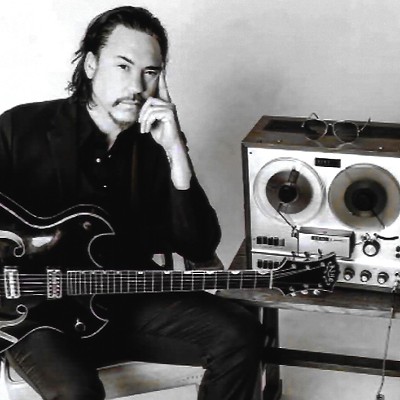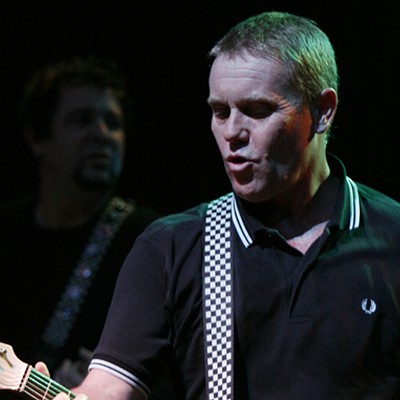The Resurrection of Johnny Cash: Hurt, Redemption, and American Recordings By Graeme Thomson 254 pp., $19.95, Jawbone Press
In 1993, Johnny Cash may have been a country-music icon, but for all intents and purposes, he was also one in need of some serious restoration. Two decades removed from his last chart hit and three from his prime, the Man in Black was reduced to putting out a string of half-hearted, commercially unsuccessful records and playing small venues with an unwieldy and archaic "jamboree" stage show while awash (to varying degrees) in substance abuse, self-doubt, and religious fervor.
Cut to a year later after the release of American Recordings and suddenly, Cash is hot... really hot. The sparse, dark record has made him a hipster's darling as stars from music and Hollywood flock to his shows at trendy spots like The Viper Room and a SXSW showcase. He was even hailed as something of an OG, a guy who - at least on record - "shot a man in Reno just to watch him die."
A man with a dark side in "Delia's Gone" faces his own jailhouse execution demise after coolly tying his unfaithful wife to a chair and shooting her dead - but with two shots since the first was to just make her suffer. Dark stuff indeed.
Suddenly, one of the most unlikely comebacks in music history was cemented. "He was as critically acclaimed as he had ever been and twice as hip," author Thomson writes in this fascinating book about the last decade of Cash's life. "He was, once again, Big Daddy Cool."
What made the sixtysomething Cash cool again can be easily - though not entirely - be summed up in one man: Rick Rubin. The portly, long-haired, Buddhist producer best known for work with rap and thrash groups like the Beastie Boys and Slayer saw something in Johnny Cash that was untapped, waiting to break out like the narrator of the telling "The Beast in Me."
The collaboration in the informally titled "American Recordings" series would result in four studio albums while Cash was alive, a 5-CD box set of outtakes and new material, and two posthumous releases.
Thomson expertly traces how Cash and Rubin partnership developed and flowered into an incredible late-life surge of creativity and output, and how - in the case of Cash - literally revitalized his life both onstage and off.
Playing with Cash's mythology and image while imbuing it at the same time, any of the albums might contain a hodgepodge of re-recorded catalogue numbers, songs Cash always wanted to tackle, original efforts, songs written specifically for the man (Nick Lowe's "The Beast in Me," Glenn Danzig's "Thirteen"), and rock covers whose feel or lyrical content both spoke to and burnished Cash's personal credo and public persona (Depeche Mode's "Personal Jesus," Tom Petty's "I Won't Back Down," Soundgarden's "Rusty Cage," U2's "One," Nine Inch Nails' "Hurt").
However, almost like a great story-song, the story of the last few years Cash's life often seemed grim. Commitments to his pre- and post-resurgence left him conflicted, and a seemingly endless series of physical problems and deterioration left the line between life and art utterly blurred as he rushed to record as much material he could before his impending death.
And anyone who could watch the video for "Hurt" - with a decrepit, puffy, ailing Cash shot amidst his own crumbling museum property and "empire of dirt" while wife June Carter Cash looks on with alternately protection and alarm - just has no heart. Few were surprised that after June died, her husband wasn't far behind.
The title and religious imagery of Thomson's book is no coincidence. Fewer country artists have more personified the Saturday-night/Sunday-morning conflict than John R. Cash. And that cover of the first American Recordings - with a looming, scowling Cash in a long black coat, brings to mind equally hellfire preacher and Old West outlaw.
Thomson's book, which includes some revealing anecdotes from daughter and country artist Rosanne Cash, will ultimately make you want to do the one thing the most successful music bios can do: go find the music.
Follow Rocks Off on Facebook and on Twitter at @HPRocksOff.






